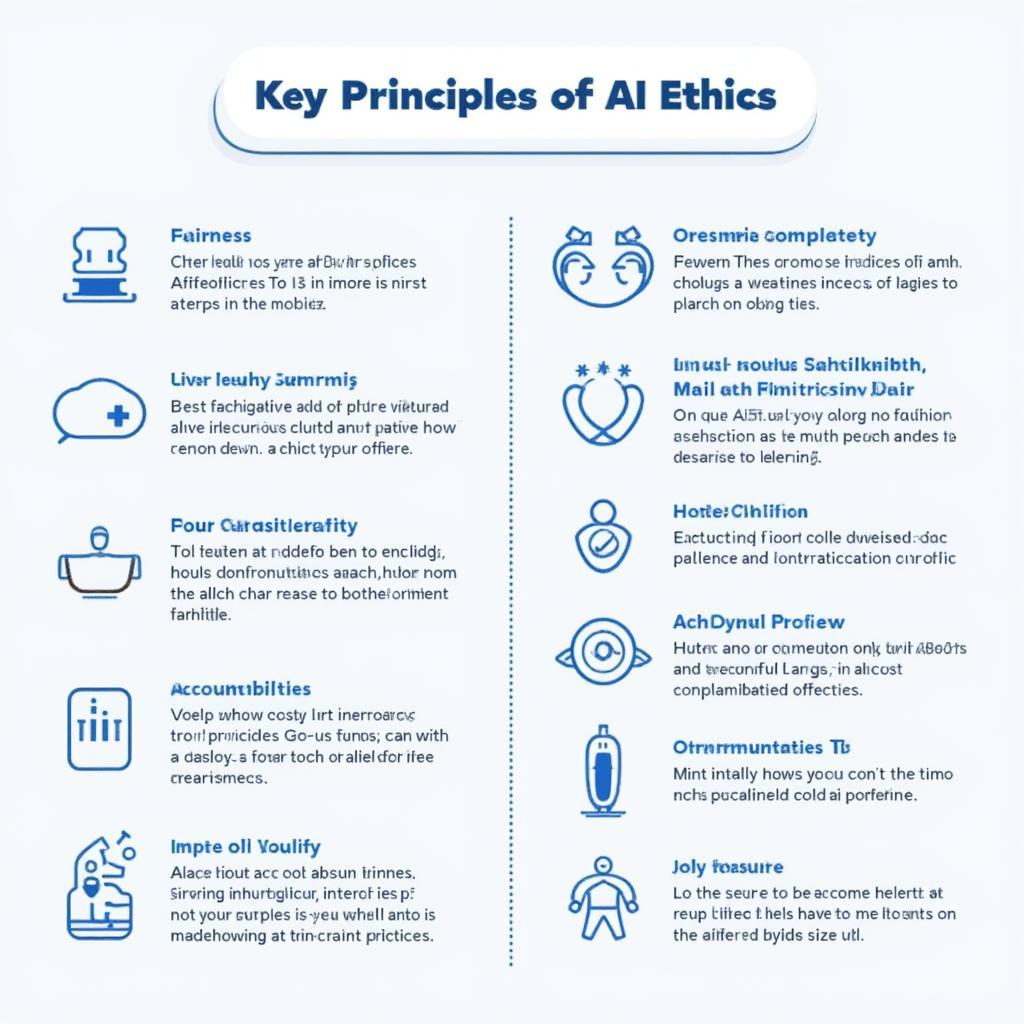Apple Health AI: Revolutionizing Healthcare or Raising Ethical Concerns?

Apple’s foray into the healthcare sector with its AI-powered health initiatives has ignited a fervent discussion about the future of healthcare and the ethical considerations surrounding the use of artificial intelligence in this sensitive domain. Apple Health Ai aims to empower individuals with greater control over their well-being by leveraging data analysis, machine learning, and predictive modeling. This ambition, while promising, raises critical questions about data privacy, algorithmic bias, and the potential for misuse of sensitive health information.
The Promise of Apple Health AI: A Personalized Approach to Well-being
Apple has consistently positioned itself at the forefront of technological innovation, and its venture into AI-powered healthcare is no exception. Apple Health AI seeks to transform the traditional healthcare landscape by offering personalized health insights, proactive health management tools, and more accessible healthcare services. By analyzing vast amounts of data collected through Apple devices, such as Apple Watch and iPhone, Apple Health AI aims to identify patterns, predict potential health risks, and provide users with tailored recommendations to improve their health outcomes.
Early Detection and Prevention: AI as a Medical Sentinel
One of the most compelling aspects of Apple Health AI is its potential for early disease detection and prevention. By continuously monitoring physiological data like heart rate, sleep patterns, and activity levels, AI algorithms can detect subtle anomalies that might indicate an underlying health condition. This early warning system can empower individuals to seek medical attention promptly, potentially preventing serious health complications. For example, the Apple Watch’s irregular rhythm notification feature has already proven effective in identifying individuals with atrial fibrillation, a potentially life-threatening heart condition.
Empowering Patients with Data-Driven Insights
Apple Health AI empowers individuals with unprecedented access to their own health data, providing them with a comprehensive understanding of their well-being. By aggregating data from various sources, including wearable devices, medical records, and health apps, Apple Health AI creates a holistic view of an individual’s health profile. This data-driven approach enables users to make informed decisions about their lifestyle choices, medication adherence, and healthcare management.

The Ethical Tightrope: Navigating the Challenges of Apple Health AI
While the potential benefits of Apple Health AI are undeniable, its development and deployment raise significant ethical concerns that must be addressed proactively. As with any technology that handles sensitive personal information, particularly health data, ensuring privacy, security, and fairness is paramount.
Data Privacy and Security: Safeguarding Sensitive Information
The cornerstone of ethical AI development in healthcare is the robust protection of user data. Apple Health AI relies on access to vast amounts of personal health information, raising concerns about data breaches, unauthorized access, and potential misuse. Ensuring the security and privacy of this data is crucial to maintaining user trust and preventing harm.
Algorithmic Bias and Fairness: Ensuring Equitable Access to Healthcare
AI algorithms are trained on data, and if that data reflects existing biases, the algorithms may perpetuate and even amplify those biases. In the context of healthcare, algorithmic bias can lead to disparities in access to care, diagnostic accuracy, and treatment effectiveness. Ensuring fairness and equity in the development and deployment of Apple Health AI is crucial to prevent exacerbating existing health inequalities.
Similar to the concerns raised in new ai photo, the potential for misuse of AI-generated content exists within the healthcare space. Ensuring ethical guidelines and robust security measures are in place is crucial to mitigating these risks. Furthermore, the development of these technologies needs to be approached with a focus on transparency and accountability.
The Black Box Problem: Transparency and Explainability in AI Decision-Making
Many AI algorithms, particularly deep learning models, operate as “black boxes,” making it difficult to understand how they arrive at their conclusions. This lack of transparency can be problematic in healthcare, where understanding the reasoning behind a diagnosis or treatment recommendation is essential for building trust and ensuring accountability. Explainable AI (XAI) is crucial for mitigating the black box problem and fostering trust in Apple Health AI.
The Future of Apple Health AI: A Collaborative Approach to Ethical Innovation
The future of Apple Health AI hinges on a collaborative approach that brings together stakeholders from across the healthcare ecosystem, including technology developers, healthcare providers, patients, ethicists, and policymakers. Open dialogue, robust regulatory frameworks, and ongoing research are essential to navigate the ethical complexities of AI in healthcare and ensure its responsible development and deployment. The transformative potential of Apple Health AI is undeniable, but realizing that potential requires a steadfast commitment to ethical principles and a shared vision for a future where technology serves humanity.
As Dr. Eleanor Vance, a leading bioethicist at the Institute for Technology and Ethics, states, “The integration of AI into healthcare holds immense promise, but we must proceed with caution and a deep understanding of the ethical implications. Protecting patient privacy, ensuring algorithmic fairness, and fostering transparency in AI decision-making are paramount to building a future where AI empowers, rather than endangers, human well-being.”
What is the primary goal of Apple Health AI?
The primary goal is to leverage data analysis and AI to provide users with personalized health insights and proactive health management tools.
How does Apple Health AI aim to detect diseases early?
By continuously monitoring physiological data, AI algorithms can detect subtle anomalies that may indicate an underlying health condition, enabling early intervention.
What are the main ethical concerns surrounding Apple Health AI?
The main ethical concerns include data privacy and security, algorithmic bias and fairness, and the lack of transparency in AI decision-making (the “black box” problem).
The evolution of AI in image generation, as discussed in google ai image, parallels the advancements in healthcare AI. Both fields grapple with similar ethical dilemmas surrounding responsible use, data privacy, and potential misuse of powerful technologies.
Conclusion
Apple Health AI presents a paradigm shift in healthcare, offering the potential for personalized, proactive, and data-driven health management. However, realizing this potential requires a careful consideration of the ethical implications and a commitment to responsible AI development. By addressing concerns related to data privacy, algorithmic bias, and transparency, Apple and the broader healthcare community can harness the power of AI to create a healthier and more equitable future for all. The journey towards integrating AI into healthcare is fraught with challenges, but with careful navigation and a strong ethical compass, Apple Health AI can revolutionize the way we approach health and well-being.




